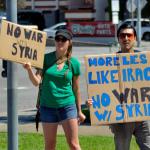“Forceful Diplomacy, Not Military Force”

Tonight, President Obama addressed the nation on Syria, indicating that he will work with the international community – Britain, China, France and Russia, among others – to place a resolution before the UN requiring Syria to surrender its chemical weapons and destroy them, under UN supervision.
The President’s remarks reflect the extraordinary events unfolding in the last two days that demonstrate that forceful diplomacy – not military force – should guide international efforts to resolve the crisis in Syria. Russia proposed a diplomatic solution to address Syria’s chemical weapons, and Syrian Foreign Minister Walid Muallem responded, "We fully support Russia's initiative concerning chemical weapons in Syria, and we are ready to cooperate. As a part of the plan, we intend to join the Chemical Weapons Convention." This could mean an important strengthening of that vital treaty.
Tonight, the President indicated that he was encouraged by the Russian proposal, and that it has “potential” to remove the threat of chemical weapons in Syria without U.S. military action. He asked that Congress postpone any votes to authorize U.S. military strikes in Syria, in order to pursue this diplomatic path. Still, the President unfortunately reserved the right to launch a military strike if the diplomatic effort does not succeed, and we urge Congress to oppose any such military authorization.
We cannot forget 2002, when then-President Bush persuaded Congress to vote for an authorization for war he claimed was only to strengthen his diplomatic hand. As we know, that authorization was instead used to justify an illegal war and occupation of Iraq, a war whose consequences continue to be felt across the region and here at home.
A potential alternative to a U.S. military strike – a strike opposed overwhelmingly by the American people and the U.S. Congress – is now on the table.
Russian, Syrian and Iranian diplomats are talking. Options that didn’t exist yesterday are suddenly on the table. The U.S. and our allies, with the United Nations in the forefront, seem ready to join those new initiatives to generate a binding, verifiable and enforceable UN resolution to rid Syria of its chemical weapons in a way that does not threaten wider war.
Today we have the possibility to turn the threat of war around. The Obama administration’s new approach is a clear recognition of a war-weary and war-opposing American people. The potential costs of this new war – human and financial – are too great in this moment of economic crisis for so many of America’s poor.
New possibilities for diplomacy – real alternatives to war – are rising. Those possibilities must be pursued urgently, seriously, and immediately.
The diplomacy must bring together all sides in Syria’s war, and all those arming and funding them. Russia and the U.S., along with Iran, Saudi Arabia, Turkey and beyond, must all be at the table with all their Syrian partners – and we must push, urge, demand an immediate ceasefire and an immediate arms embargo on all sides.
We stand against any possession, manufacture, or use of chemical weapons – and the Convention Against Chemical Weapons must be strengthened, not ignored. We don’t know for sure who used them in Syria – an international inspection team, representing the United Nations and the signatories of the Chemical Weapons Convention, should be sent urgently to determine that. The UN presence would also be an important step towards implementing a ceasefire.
This is a moment we can push for an end to all chemical weapons in Syria – and then we can broaden that effort to push just as hard for something the U.S. called for more than 20 years ago – a “zone in the Middle East free of all weapons of mass destruction.” That means chemical, nuclear, biological and all these weapons of horror. No exceptions. Throughout the Middle East.
There is renewed hope that the global community can make that turn now, today. Congress should follow the huge majorities of the American people who want to say no to any threat of war. Congress can join the Administration as both turn away from the threat of missile strikes, of escalating violence in the region, even, perhaps, the threat of a new war. We can make that turn.
The Pope reminds us “war brings on war. Violence brings on violence.” Global leaders must have the “courage take up the way of negotiations.” The Pope’s call has been joined by Nobel laureates, by Syrians desperate for an end to war, by diplomats and generals, by peace and justice advocates and politicians. We have a chance today. We must seize that chance.
The Russian proposal and these new diplomatic initiatives turn night into mid-day, and we should leave no stone unturned to seize the light.
--
Reverend Jesse L. Jackson, Sr., President and Founder, Rainbow PUSH Coalition
Phyllis Bennis, Director of New Internationalism Project, Institute for Policy Studies
